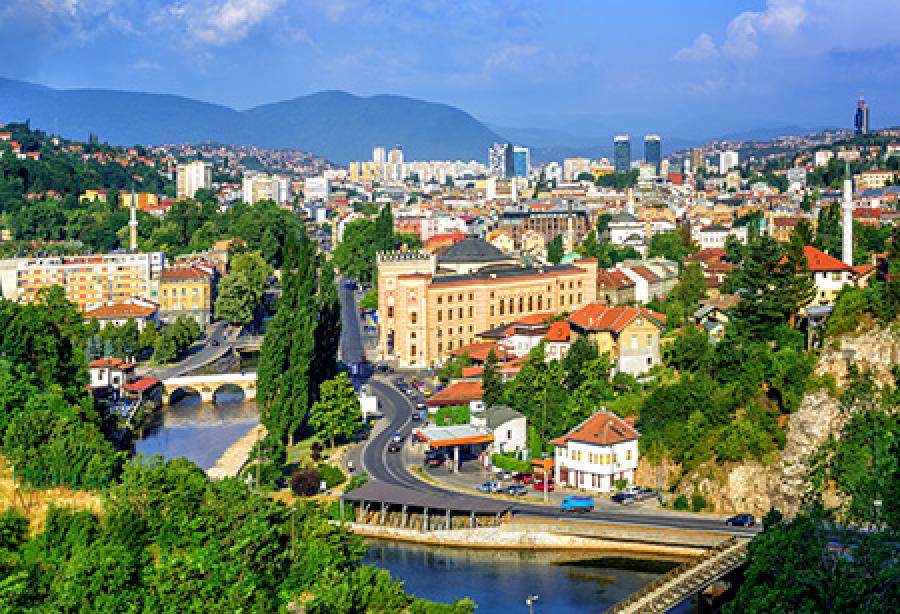The government of Bosnia and Herzegovina was ordered this week by the Office of the High Representative to amend its election law ahead of coming elections in the country. Nothing was said about aligning its constitution with a ruling by the European Court of Human Rights on equal election rights.
The Office of the High Representative (OHR) is an ad hoc international institution responsible for overseeing implementation of civilian aspects of the Dayton Peace Agreement in 1995 ending the war in Bosnia and Herzegovina (BiH).
The current High Representative is a German politician, Christian Schmidt, who used his executive powers to decide on a package of amendments to the election law. The measures should be introduced gradually for the 2024 municipal elections in selected pilot areas in order for them to be tested and be ready for wide implementation for the 2026 General Elections.
In a statement, the European External Action Service (EEAS) recalled that his executive powers should be used only as a measure of last resort against irreparable unlawful acts. The EU expects that the authorities in BiH implement the required reforms ensuring that elections are conducted in line with European standards.
Following the recent European Council’s decision to open accession negotiation, the statements says that the EU will continue to work with BiH authorities to advance on the European path.
BiH was granted candidate status in December 2022. At the latest European Council meeting on 21 March, the Council decided to open negotiations with BiH and invited the Commission “to prepare the negotiating framework with a view to its adoption by the Council the moment all relevant steps set out in the Commission’s recommendation of 12 October 2022 are taken”.
Before the lates European Council meeting, the Commission had issued an updated progress report on BiH. According to that report, the public commitment of the political leadership in BiH to the strategic goal of European integration was taken forward by important reforms and have brought positive results.
In light of the results achieved since 2022, the Commission considered that BiH “has achieved the necessary level of compliance with the membership criteria”. The Commission recommended that the Council adopts the negotiating framework “once BiH has taken further steps in line with the Commission's report”.
In the new report, the Commission identified eight steps, related to the most essential elements of the political criteria, that BiH has to take but judging by the report, the country has already largely implemented them.
Sejdić-Finci ruling not implemented
There is only one major outstanding issue and that is the implementation of the ruling by the European Court of Human Rights (EctHR) in the Sejdić-Finci case. Dervo Sejdić, of Roma origin, and Jacob Finci, of Jewish origin, are the plaintiffs, in the case.
In the ruling in 2009, the court confirmed the discriminatory nature of the electoral system in Bosnia and Herzegovina, preventing those not belonging to its “constituent peoples” (Bosniaks, Croats or Serbs) from standing for election.
“It’s strange that this important court decision from 2009 has not been implemented yet,” Finci, who is president of the Jewish community in BiH, told The Brussels Times in an interview in 2021.
“All political parties, religious communities, and NGOs are confirming that they support the full protection of human rights, according to the European convention on Human Rights, still they don’t know how to implement the ruling.”
In its 2022 progress report, the Commission wrote that the parties in BiH could not agree on a solution for constitutional and electoral reforms “to bring the Constitution in line with the European Convention on Human Rights, complying with the Sejdić-Finci and related rulings, despite an intense facilitation of talks by the EU and US”.
“Significant reforms are needed to ensure that all citizens are able to effectively exercise their political rights,” the Commission wrote then. However, it did not include the constitutional reform in its list of steps required by BiH to be granted candidate status. In the Commission’s latest progress report, the Sejdić and Finci case is not even mentioned.
Asked to comment on the case and its relevance, Peter Stano, EU’s lead spokesperson on foreign affairs, admitted that it had not been included in the steps BiH is required to take for the adoption of the negotiating framework, followed by an Intergovernmental Conference. But the case is a fundamental human rights issue and has to be raised in the accession negotiations.
The Commission is in no hurry. It will now start to prepare the work on the draft negotiating framework for BiH and stands ready to report back to the Council about the progress made by BiH in relation to these steps as necessary, at the latest as part of the next enlargement package expected in the Autumn.
The spokesperson referred to Commission President von der Leyen who mentioned that, “more progress is necessary to join our Union”, for example the electoral and Constitutional reform to ensure equality and non-discrimination of citizens.
M. Apelblat
The Brussels Times

